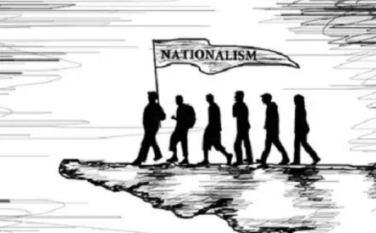Drawing:Dd1s42fuswy= Nationalism

Nationalism, with its intricate historical roots and multifaceted expressions, serves as a compelling lens through which to examine contemporary socio-political dynamics. As communities rally around shared identities and symbols, the tension between collective pride and individual liberties becomes increasingly pronounced. This duality raises critical questions about the role of nationalism in shaping governance and international relations today. What implications does this have for societal cohesion and global cooperation? Exploring these dimensions may reveal insights that challenge our understanding of nationalism’s place in the modern world.
Historical Roots of Nationalism
Throughout history, various factors have contributed to the emergence of nationalism as a powerful socio-political force. Ethnic identity and territorial claims often intersect with historical narratives shaped by colonial legacies and revolutionary ideologies.
Additionally, religious influences and economic factors have driven communities to assert their sovereignty. Global interactions have further intensified these dynamics, fostering a collective yearning for self-determination and freedom among diverse populations.
See also: Drawing:Dbrpha_Qr54= Dandelion
Cultural Expressions of National Identity
Nationalism often finds its most vivid expression through cultural identity, as communities seek to affirm their uniqueness and heritage in response to historical narratives and socio-political realities.
Folk traditions, national symbols, and cultural festivals serve as vital markers of this identity, while artistic representations encapsulate collective memories and aspirations.
Together, these elements foster a sense of belonging, resilience, and pride among individuals and communities.
Political Movements and Nationalism
Political movements have historically harnessed the power of nationalism to mobilize populations and assert claims for self-determination.
Ethnic nationalism often emphasizes shared heritage and cultural identity, while civic nationalism promotes inclusive citizenship based on shared values and principles.
Understanding these distinctions is crucial, as they shape the aspirations of diverse groups seeking autonomy, justice, and recognition within the complex tapestry of global politics.
The Impact of Nationalism Today
The resurgence of nationalism in contemporary society has profound implications for global politics, economies, and social cohesion.
Economic nationalism promotes protectionist policies, which can hinder international trade and cooperation.
Conversely, global nationalism fosters a sense of shared identity but may exacerbate tensions between nations.
Understanding these dynamics is crucial for navigating the complexities of modern governance and ensuring the preservation of individual freedoms amid rising nationalist sentiments.
Conclusion
In the tapestry of human history, nationalism weaves a complex narrative, akin to the duality of Janus, embodying both unity and discord. As the forces of globalization challenge traditional identities, the resurgence of nationalist sentiments underscores the enduring quest for cultural preservation and self-determination. The delicate balance between collective pride and individual freedoms remains a pivotal concern, necessitating a critical examination of nationalism’s multifaceted impact on contemporary society and international relations.






